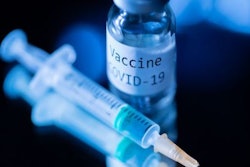 National Emotional Wellness Month as good an opportunity as any for everyone in law enforcement to take a few moments to devote some time to further discussion about police officer emotional and mental health.Image courtesy of Doug Wyllie / POLICE Magazine.
National Emotional Wellness Month as good an opportunity as any for everyone in law enforcement to take a few moments to devote some time to further discussion about police officer emotional and mental health.Image courtesy of Doug Wyllie / POLICE Magazine.
October is National Emotional Wellness Month. Organizations across the United States—from private enterprise to public education—spend some time during National Emotional Wellness Month contemplating and implementing tactics and strategies aimed at increasing individuals' emotional wellbeing.
National Emotional Wellness Month is as good an opportunity as any for everyone in law enforcement to take a few moments to devote some time to further discussion about police officer emotional and mental health.
Of course, October is also National Caffeine Addiction Recovery Month—I'm not kidding, you can look it up—but telling cops to quit coffee is like telling water to not be wet. I'd rather remain focused on doing my small part toward helping officers achieve better emotional wellness.
This is, admittedly, a topic on which I've written dozens of times before in this space. But police officer emotional wellness is a matter of paramount importance, so regularly revisiting the subject is more than merely merited.
It is crucial. It is critical.
Providing an Ounce of Prevention
According to the National Institutes of Health (NIH), emotional wellness is "the ability to successfully handle life's stresses and adapt to change and difficult times."
The National Wellness Institute (NWI) defines wellness as an "active process through which people become aware of—and make choices toward—a more successful existence."
The past 18 months—rife with increasing anti-police rhetoric from certain politicians, members of the press, and even segments of the general population—have tested the emotional wellbeing of law enforcement officers across the country more than any other time in recent memory—perhaps in history.
Add to the anti-police sentiment the ever increasing in stresses—both on the job and off it—placed on Americans by the persistent pandemic of Coronavirus and you have a recipe for real emotional problems percolating beneath the surface suddenly boiling over.
Individual officers can take charge of their own emotional wellness in myriad ways. Getting good sleep, eating well, moderating intake of alcohol, engaging in outside activities (hobbies), developing friendships with folks not immediately associated with the profession, and cultivating spiritual exploration are all excellent—and proven—sources of improved emotional wellness.
That being said, it is incumbent on law enforcement leaders to take charge and work diligently toward the goals of improving morale and increasing the emotional resiliency of their officers.
For starters, police leaders can simply recognize the great work their officers are doing. While there is so much negative being said about officers in the mainstream media narrative, people within the profession bear witness every single day to heroism—from the sublime to the seemingly superhuman—displayed by officers. Intentionally taking notice of doing great work can go a long way toward improving morale in the ranks.
Police leaders can seek to create partnerships with mental health organizations such as the National Alliance on Mental Illness, which provides "critical mental health resources and support to millions of people across the country."
Further, there is plenty of literature available to help officers in crisis. "Books like Emotional Survival for Law Enforcement" by Dr. Kevin Gilmartin, "I Love a Cop" by Dr. Ellen Kirshman, and others—providing officers with a recommended reading list isn't a bad idea. Suggesting and supporting officer participation in outside endeavors—everything from organized league sports to individual personal development—is another avenue for officers to relieve stress and improve life-work-balance.
Finally, there is the VALOR Project. The Bureau of Justice Assistance—a component of DOJ OJP—created the Preventing Violence Against Law Enforcement and Ensuring Officer Resilience and Survivability (VALOR) Initiative "to improve the immediate and long-term safety, wellness, and resilience of law enforcement officers.".
According to the VALOR website, the effort is a "multifaceted approach that includes delivering no-cost training and professional education, conducting research, developing and providing resources, and establishing partnerships that benefit law enforcement officers..."
Police agencies that are fully invested in proactively investing in the long-term safety and emotional wellness of officers have shown marked improvement in morale and job satisfaction in the ranks, thus preventing relatively small emotional problems from mushrooming into much larger, more difficult matters.
The Problem in the Extreme
Suicide is obviously the most dire outcome of untreated mental and emotional wellness problems.
The physical dangers of law enforcement are well known and widely reported. The FBI's Law Enforcement Officers Killed and Assaulted (LEOKA) Program seeks to "provide relevant, high quality, potentially lifesaving information to law enforcement" about on-duty incidents resulting in injury and death "with the hope of preventing future incidents."
Every year, officers are killed and/or seriously injured in the line of duty—assaulted with edged weapons, blunt instruments, and all manner of improvised attacks.
Unfortunately, absent from the data collected by the FBI and reported in annual LEOKA findings are officers whose lives have been ended by their own hand.
Since January 2016, Blue H.E.L.P.—an organization that tracks police officer suicides while simultaneously seeking to prevent such tragedies from occurring—has been compiling and reporting on data regarding law enforcement officers lost to suicide annually, now including information on officers who died by suicide dating back to 1979.
Blue H.E.L.P. now has more than 1,000 records of those deaths.
Almost entirely unreported are the myriad mental and emotional wounds carried by officers who persist despite injury, often not seeking or receiving treatment from a medical professional.
Fortunately, there has been increasing attention paid to the importance of addressing the psychological and emotional toll that transpires for police officers—either in the immediate aftermath of a critical incident or as a result of the constant daily stressors of the profession.
Further, the stigma that has been associated with getting mental health help has been largely diminished if not completely crushed. Officers are more inclined now to place a call to the National Suicide Prevention Lifeline (1-800-273-8255), which provides 24/7, free and confidential support for people in distress. Officers are more likely today to reach out to Safe Call Now (1-206-459-3020) an organization that offers those services specifically for first responders, or Copline (1-800-267-5463), a not-for-profit organization dedicated to serving law enforcement officers and their families by providing a confidential 24-hour hotline answered by retired law enforcement officers.
Final Words
Mental, emotional, and psychological injury that goes unaddressed can be as deadly as a survivable disease that is diagnosed but left untreated.
Chances are, you know someone who has beaten cancer. They beat cancer by identifying the problem, enlisting the assistance of qualified medical professionals, and fighting like hell.
October is not the only time to raise awareness about the importance of police officer emotional wellness or point to ways individuals and organizations can work toward improving emotional wellness, but it's not a bad time to start.
The ideas above are ostensibly pretty simple solutions to help increase officer emotional wellness, but there's a very important distinction between simple and easy. Simple is something easily understood. Easy is something that requires little effort.
It's easy to understand the importance of emotional wellness—it's simple.
Achieving emotional wellness is an entirely different matter—it's not easy.
If you're hurting, get help. If you know of someone who is hurting, offer to help them.
Emotional wellness is well worth the effort.
















